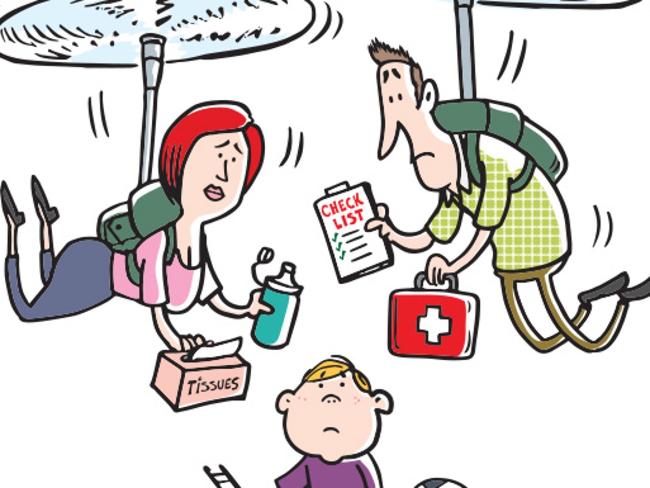Understanding Helicopter Parenting and Child Development
Confused about how to be an involved parent without smothering your kids? Here’s how to tell if you’re a helicopter parent, along with expert advice to curb the hovering.
What is helicopter parenting?
The term “helicopter parent” was first used in Dr. Haim Ginott’s 1969 book Parents & Teenagersby teens who said their parents would hover over them like a helicopter; the term became popular enough to become a dictionary entry in 2011. Similar terms include “lawnmower parenting,” “cosseting parent,” or “bulldoze parenting.” Helicopter parenting refers to “a style of parents who are over focused on their children,” says Carolyn Daitch, Ph.D., director of the Center for the Treatment of Anxiety Disorders near Detroit and author of Anxiety Disorders: The Go-To Guide.
“They typically take too much responsibility for their children’s experiences and, specifically, their successes or failures,” Dr. Daitch says. Ann Dunnewold, Ph. D., a licensed psychologist and author of Even June Cleaver Would Forget the Juice Box, calls it “overparenting.” “It means being involved in a child’s life in a way that is overcontrolling, overprotecting, and overperfecting, in a way that is in excess of responsible parenting,” Dr. Dunnewold explains.
Who is a helicopter parent?
Although the term is most often applied to parents of high school or college-aged students who do tasks the child is capable of doing alone (for instance, calling a professor about poor grades, arranging a class schedule, manage exercising habits), helicopter parenting can apply at any age. “In toddlerhood, a helicopter parent might constantly shadow the child, always playing with and directing his behavior, allowing him zero alone time,” Dr. Dunnewold says. In elementary school, helicopter parenting can be revealed through a parent ensuring a child has a certain teacher or coach, selecting the child’s friends and activities, or providing disproportionate assistance for homework and school projects.
Why do parents hover?
Helicopter parenting can develop for a number of reasons. Here are four common triggers.
Fear of dire consequences
A low grade, not making the team, or not getting a certain job can appear disastrous to a parent, especially if it seems it could be avoided with parental involvement. But, says Deborah Gilboa, M.D., founder of AskDoctorG.com, “many of the consequences [parents] are trying to prevent–unhappiness, struggle, not excelling, working hard, no guaranteed results–are great teachers for kids and not actually life-threatening. It just feels that way.”
Feelings of anxiety
Worries about the economy, the job market, and the world in general can push parents toward taking more control over their child’s life in an attempt to protect them. “Worry,” Dr. Daitch says, “can drive parents to take control in the belief that they can keep their child from ever being hurt or disappointed.”
Overcompensation
Adults who felt unloved, neglected, or ignored as children can overcompensate with their own children. Excessive attention and monitoring are attempts to remedy a deficiency the parents felt in their own upbringing.
Peer pressure from other parents
When parents see other overinvolved parents, it can trigger a similar response. “Sometimes when we observe other parents over-parenting or being helicopter parents, it will pressure us to do the same,” Dr. Daitch says. “We can easily feel that if we don’t immerse ourselves in our children’s lives, we are bad parents. Guilt is a large component in this dynamic.”
What are the consequences of helicopter parenting?
Many helicopter parents start off with good intentions. “It is a tricky line to find, to be engaged with our children and their lives, but not so enmeshed that we lose perspective on what they need,” Dr. Gilboa says. Engaged parenting has many benefits for a child, such as increasing feelings of love and acceptance, building self-confidence, and providing guidance and opportunities to grow. “The problem is that, once parenting becomes governed by fear and decisions based on what might happen, it is hard to keep in mind all the things kids learn when we are not right next to them or guiding each step,” Dr. Gilboa explains. “Failure and challenges teach kids new skills, and, most important, teach kids that they can handle failure and challenges.”
Decreased confidence and self-esteem.
“The main problem with helicopter parenting is that it backfires,” Dr. Dunnewold says. “The underlying message [the parent’s] overinvolvement sends to kids, however, is ‘my parent doesn’t trust me to do this on my own,’ [and this leads] to a lack of confidence.”
Undeveloped coping skills.
If the parent is always there to clean up a child’s mess–or prevent the problem in the first place–how does the child ever learn to cope with loss, disappointment, or failure? Studies have found that helicopter parenting can make children feel less competent in dealing with the stresses of life on their own.
Increased anxiety.
A study from the University of Mary Washington has shown that overparenting is associated with higher levels of child anxiety and depression.
Sense of entitlement.
Children who have always had their social, academic, and athletic lives adjusted by their parents to best fit their needs can become accustomed to always having their way and thus they develop a sense of entitlement.
Undeveloped life skills.
Parents who always tie shoes, clear plates, pack lunches, launder clothes, and monitor school progress, even after children are mentally and physically capable of doing the task, prevent their children from mastering these skill themselves.
How can you avoid being a helicopter parent?
So how can a parent love and care for their children without inhibiting their ability to learn important life skills? Dr. Gilboa offers this advice: “As parents, we have a very difficult job. We need to keep one eye on our children now–their stressors, strengths, emotions–and one eye on the adults we are trying to raise. Getting them from here to there involves some suffering, for our kids as well as for us.” In practical terms, this means letting children struggle, allowing them to be disappointed, and when failure occurs, helping them to work through it.
It means letting your children do tasks that they are physically and mentally capable of doing. Making your 3-year-old’s bed isn’t hovering. Making your 13-year-old’s bed is. As Dr. Gilboa says, “Remembering to look for opportunities to take one step back from solving our child’s problems will help us build the reliant, self-confident kids we need.”









